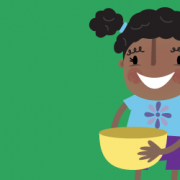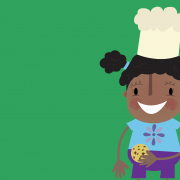Balls of butter
For this activity, you will need some whipping cream, a bowl, an electric hand mixer and some bread or crackers.
Pour the cream into a bowl and whip it with the electric hand mixer. If they are capable, have your kids take turns beating the cream. Stop once the cream is whipped and let your kids sample it.
Set aside half the whipped cream. Continue beating the remaining cream until it has turned to butter.
Spread the butter on some bread or crackers for your kids to snack on while you begin your teaching time with the discussion questions. (You might also want to reward the peacemakers in your home later by serving the whipping cream on a treat, such as buttermilk biscuits with strawberries.)
Questions for discussion
- Did the whipped cream turn into butter slowly or quickly?
- Could you tell it was about to happen?
- How can you tell if your joking around is starting to bother someone?
Read Proverbs 30:33: “For pressing milk produces curds, pressing the nose produces blood, and pressing anger produces strife.
”
- What do you think Proverbs 30:33 is saying to us?
- Let’s read Proverbs 6:16-19 and Matthew 5:9. Does it make God happy when someone is causing someone else to get annoyed?
Key concepts
Just as we didn’t know the exact minute when the whipped cream was going to turn into butter, we can’t always tell when our teasing or joking is starting to bother someone. The best way to prevent making someone angry is to stop fooling around before others get irritated.
The Bible tells us that God hates it when someone causes other people to become angry with each other (Proverbs 6:16-19). The opposite of being a troublemaker is being a peacemaker. God would rather we be peacemakers and He promises a blessing for those who choose to work toward creating peace in situations (Matthew 5:9).
When we consider how our words and actions will impact others before saying or doing things, we can avoid causing difficulties.
To follow up, discuss some different scenarios, sharing ideas about how to keep the peace in each situation rather than cause discord. Here are some example scenarios to get you started:
Your brother has forgotten to take out the garbage. You could tease him saying, “You’ll get no dessert, since you forgot to do your chores.” But what would be a good way to be a considerate peacemaker instead? (Answer: Quietly go to your brother and remind him to do his chores.)
Someone spills flour all over the kitchen counter. You could say, “Wow! You can’t even sift flour properly.” But what would a considerate peacemaker say instead? (Answer with something like this: “Don’t worry, we can wipe it up quick. I know you tried your best.”)
You are excitedly telling your friend about the great weekend you just had, but you notice your friend looks a little bored. You might feel like walking off in a huff saying, “Well, if you’re not interested in what I have to say, just forget it!” But what would be a good way to be a considerate peacemaker instead? (Possible answer: Apologize to your friend saying, “I’m sorry for rudely going on and on about myself. How was your weekend?”)
Relevant Scripture
Proverbs 30:33 “For pressing milk produces curds, pressing the nose produces blood, and pressing anger produces strife.
”
Psalm 133:1 “Behold, how good and pleasant it is when brothers dwell in unity!
”
Galatians 5:25-26 “If we live by the Spirit, let us also walk by the Spirit. Let us not become conceited, provoking one another, envying one another.
”
Matthew 5:9 “Blessed are the peacemakers, for they shall be called sons of God.
”
Romans 12:18 “If possible, so far as it depends on you, live peaceably with all.
”








